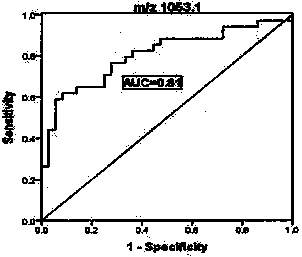Application of urine immunoglobulin kappa chain C region protein and polypeptide fragments thereof in lung adenocarcinoma
A technology of immunoglobulin and polypeptide fragments, which is applied in the application field of urinary immunoglobulin κ chain C region protein and its polypeptide fragments in the diagnosis and treatment of lung adenocarcinoma, which can solve the problems of poor patient acceptance, high cost, and increased risk of lung cancer. problems, to achieve the effect of convenient storage
- Summary
- Abstract
- Description
- Claims
- Application Information
AI Technical Summary
Problems solved by technology
Method used
Image
Examples
Embodiment 1
[0019] Example 1 Urine Specimen Collection and Processing
[0020] Randomly cleaned midstream urine samples were collected from 34 patients with lung adenocarcinoma (Beijing Shijitan Hospital Affiliated to Capital Medical University), centrifuged within 2 hours (1500rpm, 5min), and the supernatant was retained. Store in a -80°C refrigerator after aliquoting. The normal control group consisted of 36 cases (Physical Examination Center, Beijing Shijitan Hospital Affiliated to Capital Medical University). For details, please refer to the following table 1:
[0021] Table 1. Clinical data of the 2 groups
[0022]
Embodiment 2
[0023] Example 2 Magnetic Bead Purification and Isolation of Peptides from Urine Specimens
[0024] Take out the urine sample from the -80°C refrigerator, rethaw at 4°C, centrifuge (3000rpm, 10min), and take the supernatant for later use. Equilibrate Weak Cationic Magnetic Beads (MB-WCX) at room temperature and mix the magnetic bead suspension by hand. Add 10ul of MB-WCX and 10ul of magnetic bead binding buffer into the sample tube, pipette the sample gun up and down to mix well to avoid foaming. Add 5 ul of urine supernatant to the sample tube, mix well and let stand on the magnetic stand for 1 minute to separate the magnetic beads from the suspended liquid. Use a sampling gun to remove the suspended clear liquid, and the tip of the gun should avoid contact with the magnetic beads to avoid absorbing the magnetic beads. Add 100ul of magnetic bead washing buffer into the sample tube, mix well, and then place the sample tube on the magnetic stand for 1 minute, the magnetic ...
Embodiment 3
[0025] Example 3 Spot Targeting and Peptide Spectrum Generation of Urine Specimens
[0026] After calibrating the instrument with a standard, mix 1 μl of eluate with 10 μl of matrix (0.3% α-cyano-4-hydroxycinnamic acid, HCCA), and take 1 μl to spot on the Anchorchip (Autoflex MALDI TOF, Bruker-Dalton) target plate and dry at room temperature. The sample is ionized by nitrogen laser irradiation and then subjected to mass spectrometry analysis, collecting data in the range of 1000-10000 Da, and obtaining a mass spectrogram composed of protein peaks with different mass-to-charge ratios. For each MALDI crystallization point, a total of 400 laser irradiations (50 times for each crystallization point at 8 different positions) were irradiated, and the average value represented one sample, so as to obtain the peptide maps of all samples. The mass spectrograms of the normal control group and lung adenocarcinoma group were analyzed by ClinProTools2.1 analysis software, and the diffe...
PUM
 Login to View More
Login to View More Abstract
Description
Claims
Application Information
 Login to View More
Login to View More - R&D
- Intellectual Property
- Life Sciences
- Materials
- Tech Scout
- Unparalleled Data Quality
- Higher Quality Content
- 60% Fewer Hallucinations
Browse by: Latest US Patents, China's latest patents, Technical Efficacy Thesaurus, Application Domain, Technology Topic, Popular Technical Reports.
© 2025 PatSnap. All rights reserved.Legal|Privacy policy|Modern Slavery Act Transparency Statement|Sitemap|About US| Contact US: help@patsnap.com



